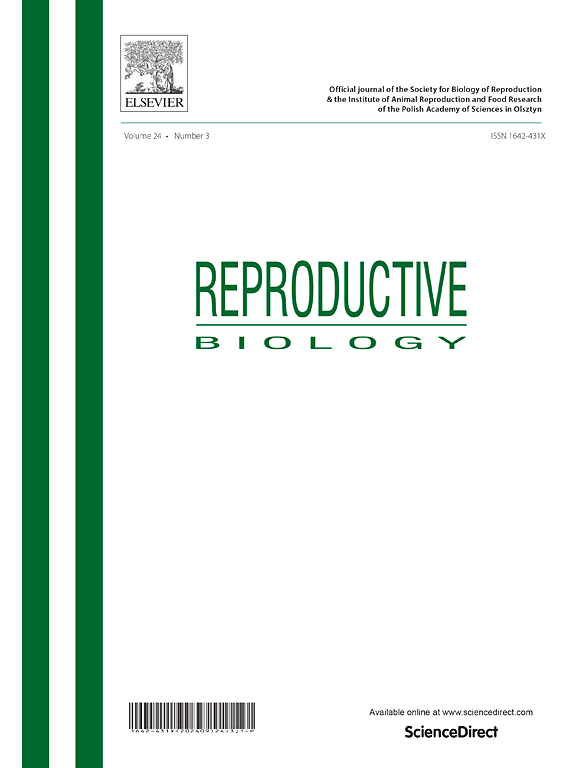毛豆提取物对链脲佐菌素诱导的糖尿病雄性大鼠睾酮水平、睾丸酶和精子发生障碍的调节作用
IF 2.5
3区 生物学
Q3 REPRODUCTIVE BIOLOGY
引用次数: 0
摘要
糖尿病是一个严重的健康问题,对男性生殖功能产生不利影响,并导致男性不育症的增加。本研究探讨了金针叶提取物对糖尿病雄性大鼠生殖功能障碍的改善作用。将40只雄性大鼠分为对照组、枫香提取物组、糖尿病组和糖尿病+ 枫香组。糖尿病大鼠表现出精子质量显著下降,血清胆固醇水平显著上升,雄烯二酮和睾丸激素水平均下降。睾丸组织的组织学检查显示精小管变性,生发细胞耗竭,间质细胞缺乏。他们还表现出睾丸酶活性的显著降低,特别是3β-羟基类固醇脱氢酶和17β-羟基类固醇脱氢酶,同时脱氢表雄酮水平升高。卡西米罗处理显著降低了胆固醇水平,提高了睾丸酶的活性,恢复了睾丸结构。结果,睾酮水平升高,精子质量得到改善。综上所述,枫香可减轻糖尿病对雄性大鼠生殖参数的负面影响,提高生殖能力。本文章由计算机程序翻译,如有差异,请以英文原文为准。
Casimiroa edulis extract modulates testosterone levels, testicular enzymes and spermatogenesis disorders in streptozotocin-induced diabetic male rats
Diabetes mellitus is a serious health issue that adversely affects male reproductive function and contributes to the rise in male infertility. This study examined the effectiveness of Casimiroa edulis leaf extract in improving reproductive impairment in diabetic male rats. Forty male rats were divided into control, Casimiroa edulis extract-treated, diabetic, and diabetic + Casimiroa edulis groups. Diabetic rats showed a notable reduction in sperm quality, a considerable rise in serum cholesterol levels, accompanied by a decrease in both androstenedione and testosterone levels. Histological examination of testicular tissue revealed degeneration of the seminiferous tubules, depletion of germinal cells, and lack of Leydig cells. They also exhibited a notable reduction in the activity of testicular enzymes, specifically 3β-hydroxysteroid dehydrogenase and 17β-hydroxysteroid dehydrogenase, along with a rise in the level of dehydroepiandrosterone. Casimiroa edulis treatment substantially reduced cholesterol levels, enhanced the activity of testicular enzymes, and restored testicle structure. Consequently, testosterone levels were elevated, and sperm quality was improved. To conclude, Casimiroa edulis may mitigate the negative effects of diabetes mellitus on the reproductive parameters of male rats and enhance fertility.
求助全文
通过发布文献求助,成功后即可免费获取论文全文。
去求助
来源期刊

Reproductive biology
生物-生殖生物学
CiteScore
3.90
自引率
0.00%
发文量
95
审稿时长
29 days
期刊介绍:
An official journal of the Society for Biology of Reproduction and the Institute of Animal Reproduction and Food Research of Polish Academy of Sciences in Olsztyn, Poland.
Reproductive Biology is an international, peer-reviewed journal covering all aspects of reproduction in vertebrates. The journal invites original research papers, short communications, review articles and commentaries dealing with reproductive physiology, endocrinology, immunology, molecular and cellular biology, receptor studies, animal breeding as well as andrology, embryology, infertility, assisted reproduction and contraception. Papers from both basic and clinical research will be considered.
 求助内容:
求助内容: 应助结果提醒方式:
应助结果提醒方式:


